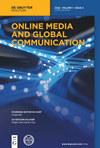数据种植:北弗吉尼亚与“世界互联网之都”数字文明的属地化
引用次数: 0
摘要
北VA和华盛顿特区都会区作为全球化数字城市系统的关键节点,其发展已经确立。本文研究了20世纪90年代和21世纪初技术地理的发展,作为人类转型的行星时代的一部分,有些人称之为“种植园世”(Plantationocene)(与人类世(Anthropocene))。对弗吉尼亚州北部地区的种族、景观和技术政策进行历史和批判性的解释性分析。本文确立了该地区对其“田园”农业景观的社会依恋,其根源在于美国内战和重建失败后种植园作为“奴隶制的死后”的重新定位的巨大不平等。然后,它提出了一种数字种植园经济中的种植园经济条件-以资源垄断,采掘形式的开发和基于“服务器农场”(又名数据中心)产业的单一作物“生态”为基础,世界上约70% %的互联网流量通过该产业流动。它将种植园新世的数字方面视为后战争和叛乱,其中对历史的操纵,“可耕种”(数字)土地的积累和控制,以及在准封建产权下对社会进程的剥夺鼓励了不平等,不可持续的,经常是暴力的文化和政治生态。考虑数字城市主义的研究人员可以使用这种方法来理解当代媒体行业的在线和离线地理。它将当代反政府和民族主义运动视为在数字媒介中发展起来的一场更长期和未解决的全球冲突的一部分,这些冲突涉及种植园制度、种族化的社会不平等和奴隶制的废除。虽然一些关于“数据殖民主义”的工作含蓄地将数字城市主义与主要以农业为重点的种植园新世工作联系起来,但本文明确地将这种联系置于特定的历史地理背景下,并将重点放在特定的政治经济行动者的角色上。本文章由计算机程序翻译,如有差异,请以英文原文为准。
Data plantation: Northern Virginia and the territorialization of digital civilization in “the Internet Capital of the World”
Abstract Purpose The development of the Northern VA and the Washington, DC metro area as a key node in the globalizing digital urban system is well established. This essay investigates the growth of that technological geography in the 1990s and 2000s as a part of the planetary epoch of human transformation that some have called the “Plantationocene” (vs. Anthropocene). Approach A historical and critical interpretive analysis of race, landscape, and technology policy in the Northern VA area. Findings The paper establishes the region’s social attachments to its “bucolic” agrarian landscape, rooted in the US Civil War and vast inequalities of the reimposition of the plantation as an “afterlife of slavery” after Reconstruction’s failure. It then suggests that the conditions of the plantation economy within a kind of digital plantation economy—featuring resource monopolies, extractive forms of exploitation, and monocrop “ecologies”—based on the “Server Farming” (aka, data center) industry through which some 70 % of the world’s Internet traffic flows. It looks at this digital aspect of the Plantationocene as post-Bellum and insurgent, in which the manipulation of history, the accumulation and control of ‘arable’ (digital) land, and the dispossession of social processes under quasi-feudalistic property rights encourage unequal, unsustainable, and often violent cultures and political ecologies. Practical implications Researchers considering digital urbanism might use this approach to understand online and offline geographies of the contemporary media industry. Social implications It treats the contemporary anti-government and ethno-nationalist movements growing in digital mediation as part of a much longer and unsettled planetary conflict over the plantation system, racialized social inequality, and the abolition of slavery. Originality/value While some work on “data colonialism” implicitly connects digital urbanism to the mostly agriculturally-focused work on the Plantationocene, this essay makes the connection explicit, place-based in specific historical-geographical contexts, and focused on the roles of specific political economic actors.
求助全文
通过发布文献求助,成功后即可免费获取论文全文。
去求助
来源期刊

Online Media and Global Communication
Communication, Media Studies, Internet Studies, International Studies, International Relations-
自引率
0.00%
发文量
0
期刊介绍:
Online Media and Global Communication (OMGC) is a new venue for high quality articles on theories and methods about the role of online media in global communication. This journal is sponsored by the Center for Global Public Opinion Research of China and School of Journalism and Communication, Shanghai International Studies University, China. It is published solely online in English. The journal aims to serve as an academic bridge in the research of online media and global communication between the dominating English-speaking world and the non-English speaking world that has remained mostly invisible due to language barriers. Through its structured abstracts for all research articles and uniform keyword system in the United Nations’ official six languages plus Japanese and German (Arabic, Chinese, English, French, Russian, Spanish, Japanese, and German), the journal provides a highly accessible platform to users worldwide. Its unique dual track single-blind and double-blind review system facilitates manuscript reviews with different levels of author identities. OMGC publishes review essays on the state-of-the-art in online media and global communication research in different countries and regions, original research papers on topics related online media and global communication and translated articles from non-English speaking Global South. It strives to be a leading platform for scientific exchange in online media and global communication.
For events and more, consider following us on Twitter at https://twitter.com/OMGCJOURNAL.
Topics
OMGC publishes high quality, innovative and original research on global communication especially in the use of global online media platforms such as Facebook, TikTok, YouTube, Twitter, Instagram, WhatsApp, Weibo, WeChat, Wikipedia, web sites, blogs, etc. This journal will address the contemporary concerns about the effects and operations of global digital media platforms on international relations, international public opinion, fake news and propaganda dissemination, diaspora communication, consumer behavior as well as the balance of voices in the world. Comparative research across countries are particularly welcome. Empirical research is preferred over conceptual papers.
Article Formats
In addition to the standard research article format, the Journal includes the following formats:
● One translation paper selected from Non-English Journals that with high quality as “Gems from the Global South” per issue
● One review essay on current state of research in online media and global communication in a country or region
 求助内容:
求助内容: 应助结果提醒方式:
应助结果提醒方式:


